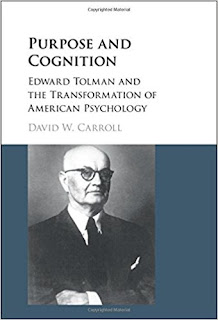There has been another prolonged absence on this blog, about 5 months this time. While a shame, at least that time has been productive. I completed a few projects and began a few more. It is time to restart things here.... again.
Later this week, I will start with a review of the recently published biography of E.C. Tolman.
After that, I will start reviewing articles from this year's Special Issues of the journal Ecological Psychology, which were dedicated to the 50th anniversary of Gibson's "
The Senses Considered as Perceptual Systems." (They can be found
here, and
here.) That book was crucial because it was the first big statement about Gibosn's system, following only a small number of articles hinting about the direction his thinking was moving in. It is less read than his 1979 books, which is a shame, because in many ways it lays the system out better, including more in depth discussions about the physiology and evolution of sensory systems. I've skimmed some of the articles in the Special Issues, and there is some really impressive scholarship there; things that I hope will influence the field for many years to come, and which deserve to have influence beyond the field. Where I can, my focus will be on drawing out what I see as the larger morals in the articles, rather tan simply summarizing them.
Two additional things I hope to start working on: 1) Telling people a bit about my current job. 2) Sharing nifty announcements from the various societies I'm associated with.
With the latter in mind, it is worth noting that the journal
History of Psychology has been promoting it's section reserved for not-full-length-article contributions to the field.
A reminder that the Sources, Research Notes, and News section of History of Psychology is a venue for publication of brief research notes,
discussion of methodology, and reports on archives or sources. If you
are interested in contributing something to this section please contact
me.
Additionally, a plug for our “News & Notes Poetry Corner,” which emphasizes the marginal, yet notably amusing, role of psychology-oriented poetics in the history of the field. If
you’re “holding” any little known or much lauded poetic gems by or
about psychologists or psychology, I invite you to send them along to be
featured.
People interested in submitting to that should email
news.editor@historyofpsych.org
